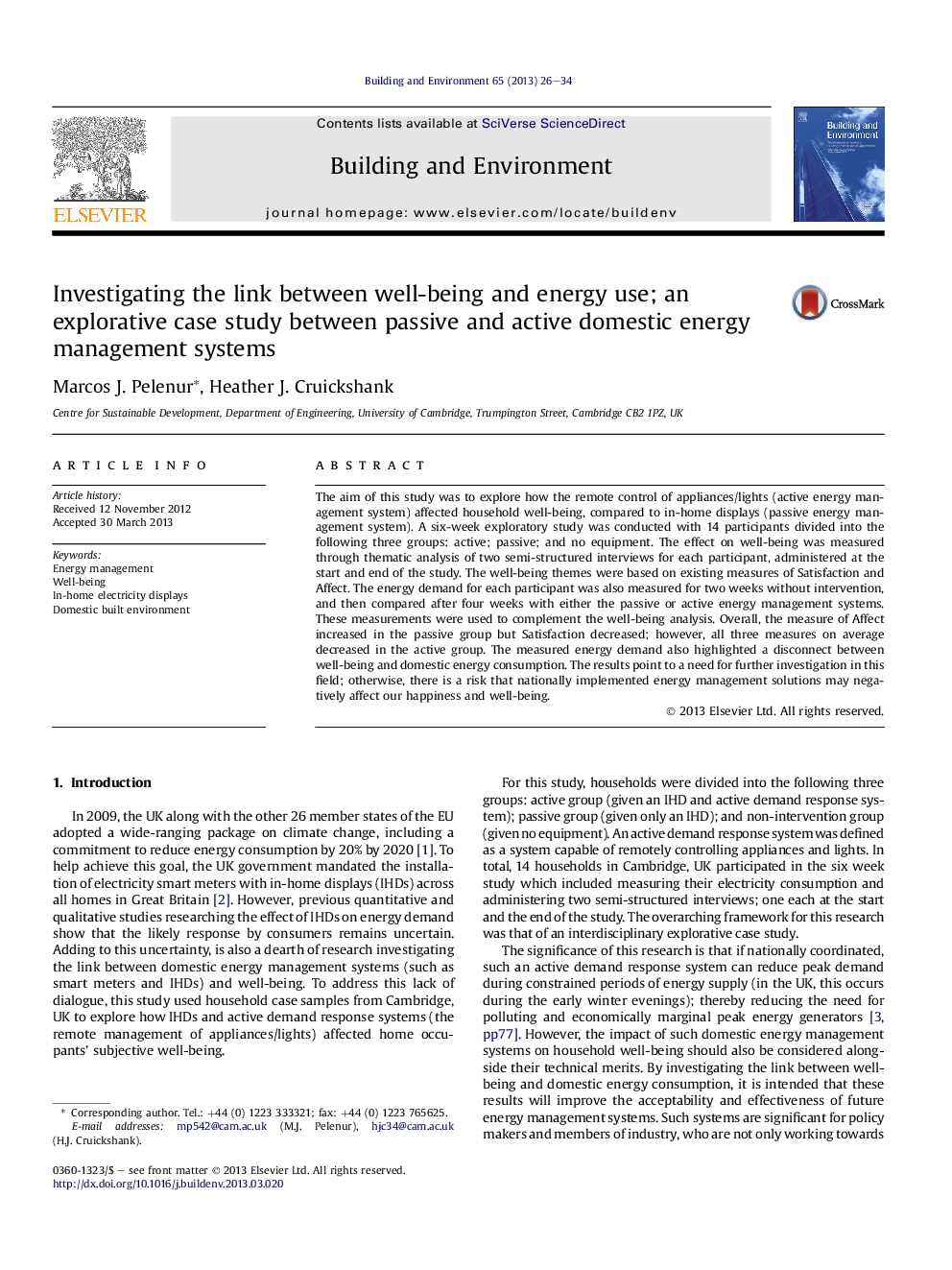| کد مقاله | کد نشریه | سال انتشار | مقاله انگلیسی | نسخه تمام متن |
|---|---|---|---|---|
| 6700943 | 502557 | 2013 | 9 صفحه PDF | دانلود رایگان |
عنوان انگلیسی مقاله ISI
Investigating the link between well-being and energy use; an explorative case study between passive and active domestic energy management systems
ترجمه فارسی عنوان
بررسی رابطه بین سلامت و مصرف انرژی؛ یک مطالعه موردی اکتشافی بین سیستم های مدیریت انرژی منفعل و غیر فعال
دانلود مقاله + سفارش ترجمه
دانلود مقاله ISI انگلیسی
رایگان برای ایرانیان
کلمات کلیدی
مدیریت انرژی، تندرستی، صفحه نمایش برق خانگی، محیط داخلی داخلی
ترجمه چکیده
هدف از این مطالعه بررسی نحوه کنترل از راه دور لوازم / چراغ (سیستم مدیریت انرژی فعال) بر سلامت خانوار نسبت به صفحه نمایش در خانه (سیستم مدیریت انرژی منفعل) است. یک مطالعه اکتشافی شش هفته ای با 14 نفر شرکت کننده به سه گروه زیر تقسیم شد: فعال؛ منفعل؛ و هیچ تجهیزات. تأثیر بر سلامت از طریق تجزیه و تحلیل موضوعی دو مصاحبه نیمه ساختار یافته برای هر شرکت کننده که در ابتدای و پایان مطالعه مورد استفاده قرار می گرفت، اندازه گیری شد. تمایلات خوشبختی براساس معیارهای رضایت و تاثیر است. تقاضای انرژی برای هر شرکت کننده نیز بدون مداخله برای دو هفته اندازه گیری شد و پس از چهار هفته با سیستم های مدیریت انرژی منفعل یا غیر فعال مقایسه شد. این اندازه گیری ها برای تکمیل تجزیه و تحلیل بهزیستی مورد استفاده قرار گرفت. در کل، میزان تأثیر در گروه منفعل افزایش یافت، اما رضایتمندی کاهش یافت؛ با این حال، تمام این سه اقدام به طور متوسط در گروه فعال کاهش یافته است. تقاضای انرژی اندازه گیری نیز اختلاف بین سلامت و مصرف انرژی داخلی را نشان داد. نتایج نشان می دهد که نیاز به بررسی بیشتر در این زمینه است؛ در غیر این صورت، یک خطر وجود دارد که راه حل های مدیریت انرژی اعمال شده در سطح ملی ممکن است بر روی خوشبختی و رفاه ما تاثیر منفی داشته باشد.
موضوعات مرتبط
مهندسی و علوم پایه
مهندسی انرژی
انرژی های تجدید پذیر، توسعه پایدار و محیط زیست
چکیده انگلیسی
The aim of this study was to explore how the remote control of appliances/lights (active energy management system) affected household well-being, compared to in-home displays (passive energy management system). A six-week exploratory study was conducted with 14 participants divided into the following three groups: active; passive; and no equipment. The effect on well-being was measured through thematic analysis of two semi-structured interviews for each participant, administered at the start and end of the study. The well-being themes were based on existing measures of Satisfaction and Affect. The energy demand for each participant was also measured for two weeks without intervention, and then compared after four weeks with either the passive or active energy management systems. These measurements were used to complement the well-being analysis. Overall, the measure of Affect increased in the passive group but Satisfaction decreased; however, all three measures on average decreased in the active group. The measured energy demand also highlighted a disconnect between well-being and domestic energy consumption. The results point to a need for further investigation in this field; otherwise, there is a risk that nationally implemented energy management solutions may negatively affect our happiness and well-being.
ناشر
Database: Elsevier - ScienceDirect (ساینس دایرکت)
Journal: Building and Environment - Volume 65, July 2013, Pages 26-34
Journal: Building and Environment - Volume 65, July 2013, Pages 26-34
نویسندگان
Marcos J. Pelenur, Heather J. Cruickshank,
